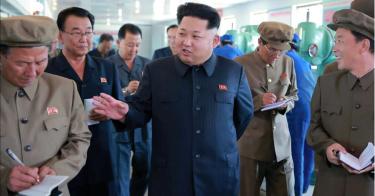President Trump’s emerging policy toward Asia emphasizes military power above economic and humanitarian engagement. In part, this is in response to what he has identified as the U.S.’s primary concern in the region: North Korea. But Trump’s policy risks focusing too much on what are perceived to be urgent threats while sacrificing some of America’s longer term foreign policy goals.
One centerpiece of U.S. policy in Asia has been—and should continue to be—advancing American principles in the region. As Jamie Fly, counsel for foreign and national security affairs for Sen. Marco Rubio (R-Fla.) remarked at a recent Heritage Foundation event, “[The U.S.] needs to be very careful and not forget that our values, and the democratic allies we have, are one of our most powerful tools when we debate the future of the Asia Pacific.”
The U.S. has a history of advancing democracy in Asia, starting with Japan, South Korea, and Taiwan, and continuing until today with the burgeoning democratization of Burma. Capitalizing on that experience and the strength of democratic allies already in Asia is essential to continued U.S. engagement. As Fly observed, without the promotion of human rights and economic freedom in the Asia Pacific, “the U.S. risks being left behind in the region.”
The current administration has not signaled a strong interest in advancing human rights in Asia. It has, however, demonstrated an interest in addressing at least one variety of abuse: human trafficking. Only a month into his presidency, he convened a meeting with key actors in the anti-trafficking field. Perhaps human trafficking will serve as a gateway issue to jumpstart U.S. action on other pressing human rights challenges in the region. Asia, home to an estimated two-thirds of trafficking victims, is a key region for the U.S. to lead on these issues.
Additionally, the U.S. should continue to address faltering democracies and call out governments for their failure to protect the rights of their citizens. Since North Korea is already a top priority for the administration, they would be remiss if they chose to ignore the glaring human rights abuses committed by the brutal Kim regime.
After the release of the report of the United Nations Commission of Inquiry (COI) on Human Rights in North Korea, the world can no longer deny the severity of Pyongyang’s crimes. The COI accused the regime of committing crimes against humanity, the evidence of which included an estimated 80,000 to 120,000 being held in camps as political prisoners. Addressing these alleged crimes can and must be a broader component of U.S. policy toward North Korea.
But North Korea is far from the only Asian nation in need of serious U.S. attention. Southeast Asian countries—including the budding democracy in Burma, and the faltering one in Cambodia—are in need of continued, consistent attention. That kind of attention, however, can only be forthcoming if the State Department is fully staffed. Currently, it is not.
Finally, the Trump administration should go beyond the weak efforts of the last administration to defend and protect the religious freedom of persons in Asia. A recently released the report from the U.S. Commission on International Religious Freedom recommends that the State Department’s International Religious Freedom Office re-designate Burma, China and North Korea as counties of particular concern.
It further encouraged State Department to designate Pakistan and Vietnam as countries of particular concern. Moreover, the report placed Afghanistan, India, Indonesia, Laos and Malaysia on the Tier 2 list, to be watched in case religious freedom violations become increasingly severe. The U.S. has long been a proponent of religious freedom and should continue to coordinate with our Asian partners to advance those freedoms.
A strong policy toward Asia cannot be accomplished without bearing human rights concerns in mind. The Trump administration should turn its attention toward these causes, recognizing that to maintain U.S. influence in Asia, it is critical that the U.S. continue to advance a basic respect for natural rights.
This piece originally appeared in Forbes



